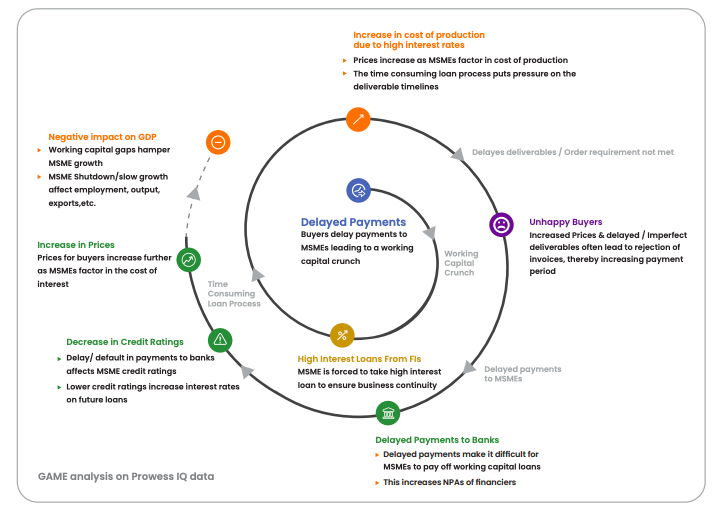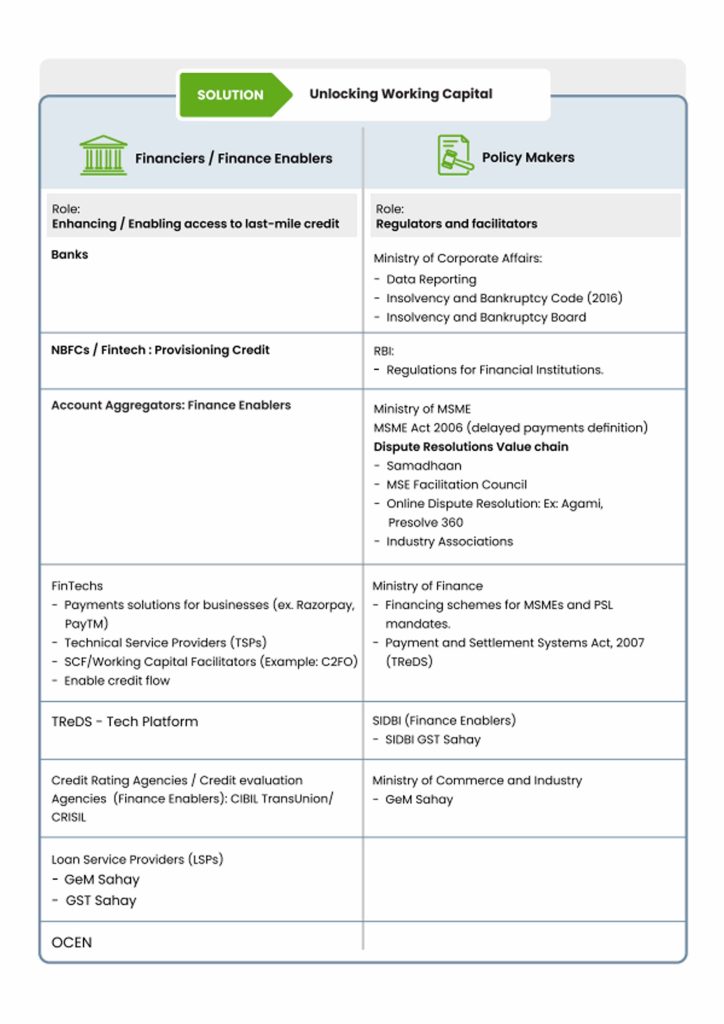Initiatives
Based on the curriculum, we curate custom programs and products for varied educational organizations, learning institutes and other student-oriented platforms.

Despite its importance in the economy, the MSME sector continues to face considerable challenges that prevent improvements in both its share in the Gross Value Added and the lives of people it employs.
Globally, the MSME sector comprises a very large number of small businesses that are marked by informality and low productivity. The World Bank has highlighted how access to financing remains one of the most significant constraints to the survival, growth and productivity of MSMEs for emerging economies.
Cash flow is the lifeblood of any business. Positive cash flow allows MSMEs to invest in more production cycles, meet statutory payments on time, and even access credit. To manage cash flow mismatches, MSMEs borrow from financial institutions or local money lenders, a cost which ultimately prices up the of goods sold or services provided.
Payment delays to MSME suppliers remains an endemic and intractable problem in India. MSMEs contribute 33.5% of India’s annual GVA [MSME Annual Report 2020-21, Ministry of Micro, Small, and Medium Enterprises], and the smallest of them – micro enterprises – employ 97% of all people employed by MSMEs, as well as an estimated 23% of India’s total workforce*. Payments when delayed to MSME suppliers by their larger buyers hinders not just the viability and growth of MSMEs, but overall competitiveness of the Indian economy. An estimated INR 10.7 Lakh Crore i.e. 5.9% of the gross value added (GVA) of Indian businesses is locked up annually as delayed payments from buyers to MSME suppliers.
Fundamentally, payments are delayed because of a power asymmetry between smaller suppliers and large buyers. By and large, the structure of supply chains mirrors the structure of biological food chains: lots of small suppliers supply to a smaller number of large buyers, who aggregate, assemble, and sell value-added goods and services to the end customer. This is even more true in an Indian context where many formal industries are dominated by a few established players, particularly in areas like healthcare, high-end manufacturing, and of course, the public sector (with Maharatna and Navratna PSUs often having near-monopolies in raw materials and industrial commodities).
The great power (through size or frequency of orders) wielded by larger players in a supply chain comes with the responsibility of paying suppliers on time and negotiating payment terms that are reasonable and fair for the smaller parties. By withholding payments (or trade payables) beyond the agreed credit periods, buyers essentially get access to free cash to finance their own working capital cycles, at the cost of their deprived. If this happens repeatedly and across industries, then it indicates that delaying payments is being deployed widely as a tactic by larger businesses to accumulate gains that should be distributed back to those who provide value to them.

For most MSMEs, delayed payments have become normalized and an attribute of India’s business culture. MSMEs capable of differentiating themselves to win the loyalty of buyers and incentivize good behavior from them do so, but often at the cost of their own profitability. These businesses include the probability of receiving delayed payments into their way of doing business, as an implicit and concealed cost of operations. Buyers, on their part, claim that delayed payments occur for reasons out of their control, although this claim must be held to a higher burden of proof and standards of accountability.
Beyond hard numbers, the persistence of delayed payments reduces trust in the Indian economy. At a systems level, the balance of delinquency against diligence impacts the level of certainty and trust, both essential components of a well-functioning economy and society. Simply put, the absence of fear of being cheated along with predictability of outcomes help businesses make better, longer term, and more strategic decisions for their future. High-trust societies and systems have repeatedly proven to be better at achieving collective goals than low-trust counterparts.
If India is to become a five or even ten trillion-dollar economy, it must ensure that its economic actors are reliable and trusted, and timely payments are made to MSMEs by buyers. This can go a long way towards reducing the transaction costs of conducting business in India and encouraging greater job creation by enabling a culture of considered risk-taking. At the moment, our economy seems a far way off from this reality.

GAME was the first to highlight the importance of Delayed Payments as a wicked problem plaguing the MSME sector and we brought out our first report on this issue in 2022. And taking the discussion a step further GAME has also launched the Delayed Payments 2.0 report in March 2023 which is the first ever solution focused study which suggests plausible solutions for this problem with three central pillars – Government and Policy Makers, Finance Enablers and Financiers, and Large Enterprises (including PSUs) for resolving Indian MSME’s financial crisis, as well as focus on creating an additional 10 crore jobs by 2030.
Unlocking the full potential of India's MSMEs through prompt payments
Imagining solution to unlock working capital for MSMEs

Based on the curriculum, we curate custom programs and products for varied educational organizations, learning institutes and other student-oriented platforms.

Engaging with content and implementation partners to ensure that EMC initiatives can reach millions of students.

Our esteemed and respected taskforce comprises of people whose work spans across the grassroot to policy

We help our partners in building standardized frameworks for assessing and analyzing the impact of the ongoing/completed programs to be used as benchmarks for scaling future programs.










Get insights into ‘Entrepreneurship Education’ and why it is the need of the hour.
Junior Achievement India Services (JAIS) is registered under section 25 of The Companies Act, 1956. Global Alliance for Mass Entrepreneurship (“GAME”) is the brand of Junior Achievement India Services (JAIS) and all intellectual properties in this regard are owned by JAIS. The names GAME and JAIS are interchangeably used in all communication with funders, partners and other stakeholders.
© Copyright 2024 by JUNIOR ACHIEVEMENT INDIA SERVICES
Daniel Isenberg has been a thought and practice leader in entrepreneurship and entrepreneurship ecosystems and has pioneered the Scale Up® methodology which has been applied in regions in Colombia, the US, Trinidad & Tobago, India, and Brazil.
As of 2025, these projects have included over 35 Scalerator® cohorts with over 500 companies representing over $2 billion in economic engagement.
For over 20 years Dan was a business professor at Harvard and Columbia (adjunct). Based in Israel for 25 years until 2006, Dan was an entrepreneur, entrepreneurship teacher and venture capitalist in Israel and since has made over 100 investments in ten countries and is an investor in global VC funds.
Dan authored Worthless Impossible and Stupid: How Contrarian Entrepreneurs Create and Capture Extraordinary Value and over 35 digital and print articles on entrepreneurship and entrepreneurship ecosystems in the Harvard Business Review.
In 2012 Mikhail Gorbachev awarded Dan the Pio Manzu Award for “Innovations in Economic Development.” Dan holds the Ph.D. degree from Harvard University.
Subhash Kiran Kasarapu is a seasoned rural development professional with over 15 years of experience in vocational education, enterprise promotion, IT systems, and large-scale livelihood programs. He has held leadership roles in institutions like EGMM, NRLM, SEEDAP, and the Andhra Pradesh Food Processing Society. He was instrumental in the design and rollout of transformative initiatives such as Rajiv Yuva Kiranalu, Start-Up Village Enterprise Programme, and KRuSHE, focusing on employment generation and sustainable livelihoods for underserved communities.
He is also an entrepreneur, having founded Phoenix Research and Consulting Solutions Pvt. Ltd., which delivered cost-effective IT and MIS solutions to non-profits across India. An alumnus of JNTU Hyderabad and IRMA, with additional training from IIM Bangalore, Subhash is passionate about leveraging technology and partnerships to drive social impact.
In his personal time, he enjoys gardening and aspires to establish a plant nursery combining his love for nature with sustainability.
With over a decade of experience in resource mobilisation, strategic partnerships, and scaling social impact organisations as a dynamic and mission-driven professional, Pallavika has been recognised for driving transformational organisational growth, designing high-impact programs, generating mission-aligned collaborations, and effective stakeholder engagement & communications across varied areas of financial stability, education, healthcare, livelihoods, and disaster response.
Rooted in a deep belief in adaptability and strong systems, her leadership is shaped by the conviction that lasting impact requires both strategic rigor and compassionate execution. Whether strengthening organisational capacity or designing community-driven solutions, she is committed to creating change that outlasts individuals.
In her own time, she loves a good game of badminton, a relaxing swim, or a good book with coffee. She likes to stay connected with family and friends closely and have deep love and compassion for dogs, with two handsome boys back at home.
Neeraj Adya is a seasoned professional with over 18 years of experience in retail banking and government consulting. An alumnus of IIM Bangalore and NIT Nagpur, he specialises in financial inclusion, enterprise development, livelihood programs and investment promotion.
With a strong background in banking operations, he has worked with leading financial institutions to enhance service delivery and expand financial accessibility. Neeraj has collaborated with senior government officials across three states, playing a key role in policy formulation, developing District Export Action Plans and diagnostic study reports, and driving large-scale investment initiatives. His ability to integrate banking expertise with public policy enables him to bridge the gap between financial institutions and government programs, fostering sustainable economic growth.
At GAME Neeraj is working as Program Lead for State Enterprise Mission (SEM) in Uttar Pradesh.
Madhu Khatri is a seasoned C-Suite executive with over 30 years of global experience working with multinational companies as a trusted advisor to corporate leaders (Boards, CEOs & the Chairperson) on risk mitigation & compliance, reputation management, business strategy, mergers & acquisitions. Madhu was the General Counsel of Wipro, Head of the legal department of Microsoft India, GE HealthCare South Asia and has extensive litigation experience in tax courts and the Supreme Court of India. Most recently Madhu was Chief Evangelist of a Seattle based legal tech startup to evangelize technology adoption with key stakeholders & customers and worked with the product team on product innovation. A passionate believer in leveraging the global trend of digital transformation she has led many technology policy discussions with the government and thought leaders. She is passionate about leveraging her experience as a board member for companies.Madhu has also been the Chair of D&I ( diversity and Inclusion) committees. Born and raised in India, Madhu graduated from Lady Shri Ram College with a B.A in Political Science (Hons), a Bachelors in law (LL.B) from Delhi University and a Masters in Law ( LL.M) from Columbia University, New York.
Jagtap brings with him over 40 years across the automotive, commercial vehicle, and agricultural sectors.
As the former Managing Director & CEO of John Deere India, Shailendra has a proven track record of driving growth, innovation, and operational excellence. His leadership focused on integrating precision technologies, enhancing operational efficiencies, and creating sustainable business practices, which aligns with our mission to build a vibrant entrepreneurial ecosystem across India.
Shailendra is also deeply committed to skill development and workforce empowerment, as demonstrated by his role as a member of CII’s National Committee on Skill Development. He has been actively involved in policy advocacy at both the state and central government levels and is a passionate champion of diversity and inclusion. He is a Six Sigma Black Belt and a certified trainer on Diversity & Inclusion, with a strong focus on creating inclusive, high-performance workplaces.
Additionally, Shailendra has served on various industry forums and boards, including AMCHAM, where he has held leadership positions. He has been recognised with multiple awards, including the Rodney D. Chipp Memorial Award and the WeLocal Integrator Award, highlighting his contributions to industry leadership and social impact.
At GAME, Shailendra leads the Place-Based Entrepreneurship vertical.
Devaraj Devappa is a Chartered Accountant and has been engaged in the profession of accounting from 1981 till 2018, when he retired from the partnership firm. After retirement he continues being part of SDU as an Advisor. He is a Director on the Board of Crossdomain Solutions Private Limited and Exdion Solutions Private Limited. He is a shareholder in Accretive Wiz@work Consultants Private Limited. He is also involved in the hospitality industry and also the social sphere. He is the Trustee of Sri Adichunchanagiri Shikshana Trust (involved in education) and Krishik Sarvodaya Foundation (Empowerment of Rural Youth and Talents). He has served on many of the advisory bodies of several Non Profit Organisations and at present is on the Audit Committee of Karnataka State Cricket Association.
A Chartered Accountant with over 21 years of audit experience, Usha A Narayanan was appointed to the statutory board of GAME in 2024.
Usha was one of the first women to be admitted to Partnership in Lovelock & Lewes (member firm of Coopers and Lybrand) in 1997. She was an Audit Partner with Price Waterhouse and served as Lead Engagement partner on large Indian listed companies and Indian subsidiaries of multinationals. She was also a member of the PW India Assurance Leadership Team, leading transformation and change management initiatives. Usha also led the National Human Capital function in policy formulation, SOPs configuration and implementation.
With a wealth of experience serving on boards of companies, Usha is currently a Nominee Director of a US shareholder on the board of an agro-organic fertilizer/ pesticides company. She is also a Director/Audit Committee Chair on the boards of an NBFC fintech company and an insure-tech company.
Her experience and understanding of the role of audit committees and auditors, deep knowledge in assessing business risks and controls, company law, accounting, auditing standards and their business application are essential for navigating the complex landscape of the social impact sector, ensuring GAME’s compliance with governance standards.
Banmali Agrawala recently retired as President of Tata Sons and was driving the Tata Group’s ventures in Infrastructure, Aerospace and Defence industries. He is now a Senior Advisor at Tata Sons and Chairman of Tata Electronics and Tata Advance Systems Ltd. He joined Tata Sons from GE where as President and CEO for GE India and South Asia, he was responsible for all of GE’s operations in the Region. Banmali holds a BE from Mangalore University and has completed the Advanced Management Program at Harvard Business School. A veteran with over 30 years of global experience, he started his career with the Wartsila Group where he spent over 20 years, both in India and in Finland. He subsequently joined the Tata Group as Executive Director (BD & Strategy) and a member of the Board of Tata Power and Director on other Tata Power entities.
Malathi N Subramaniam has over 18 years of experience specialising in Accounting Services, Budgeting and Forecasting, Internal Audit and Risk Management. Before joining GAME, she worked with Crestworth Management Partners Pvt. Ltd., Société Générale Global Solutions Centre Pvt Ltd., and M/s Singhvi, Dev and Unni – Chartered Accountants, amongst others where she was instrumental in implementing SOX and Internal Financial Controls.
A Chartered Accountant and commerce graduate from Bangalore, Malathi is also interested in reading and travelling. Her husband retired as a Brigadier in the Indian Army and they have two sons.
With over 16 years of work experience in marketing and communication, Elita Sequeira has worked across various sectors, including mobility, telecom, tech, finance and fintech, with both MNCs and startups. However, her favourite kind of work has been in the social impact space.
She has spent her career focusing on external and internal communications, having worked with leading PR firms such as Adfactors PR, MSL Group and Edelman. At GAME, her focus areas are external communications, convenings and thought leadership.
Armed with rich experience of over 22 years across varied industries with demonstrated expertise in strategic 360 degree view of people functions, Raja calls himself a partner in developing the leadership capital of the company. From managing his own venture to managing people functions across various industries including deep sciences, IT, consumer goods, his adventurous journey continues to explore new boundaries keeping a deep focus on understanding people, their aspirations, behavior and their leadership potential. He leads the People Strategy function at GAME.
Some of the areas he has extensive experience in are 1) Design & Curation of Personal, Team and Organization transformation programs for leaders for themselves & for their units 2) Exposure and appreciation of businesses across and geographies including HR for Life sciences, personal computing, Enterprise products, Infrastructure Services, Software Development, Consulting and Total Outsourcing across the globe. 3) Adept in partnering with a globally diversified leadership and managing a versatile workforce including P&L leaders, Client engagement managers, High end domain consultants, R&D specialists, Sales field force, Delivery heads 4) Hands on experience in Client engagement scenarios including Acquisitions, JV and people transition across the globe. 5) Appreciation of Compensation & benefits, Design and implementation of Variable programs, costing and budgeting. 6) Sales force assessment, design and execution of leadership development programs. 7) Leading and providing thought leadership to a large group of HR professionals.
Poulomi has been engaged for the last, nearly, 18+ years in the development sector, particularly at the interfaces of gender, livelihoods and financial inclusion in the domains of business development, designing and implementation of large scale livelihood programs & community led initiatives, M&E and Impact across various categories and associated intersectionality. Her focus has been on robust design for scalability and impact. She has worked in programs spanning 23 states and even international regions including Kenya and Nigeria. Throughout her professional engagements, she has strived to achieve key program/project objectives through the spirit of collaboration and setting up of strategic partnerships with a diverse set of stakeholders & spectrum – businesses and social sector. One of the ways in which she has attempted to institutionalize and sustain interventions, is through the development of various tools and innovative content. Over the years, Poulomi has worked extensively in the area of Impact and MnE, Capacity building of various partners and curating collectives, program scaling with impact and managing cross sectional and diverse stakeholders.
At GAME Poulomi is working as the head of programs providing solutioning, impact design, partnerships and implementation support to all the GAME led programs.
Ketul Acharya has over 25 years of professional Experience. He has been instrumental in building, managing & scaling initiatives in Education, Employability, Employment & Cluster development space, working with various stakeholders, including Government, Corporates, MSMEs, Technology Companies, Financial Institutions, CSO and Multilateral Institutions.
His last assignment was as COO of GoodWorker Technologies (founded by Temasek, Singapore), a Jobs & Learning digital platform start-up. Before this, he was the COO & Group head of Learnet Skills (JV of NSDC & Schoolnet India) and was instrumental in the industry-led UNIDO cluster development initiative.
Ketul will provide leadership and oversight to scale GAME as the global catalyst for mass entrepreneurship.
With 38 years of experience in IDBI/SIDBI, Ramesh Dharmaji has worked extensively in the promotion, development and financing of MSMEs across various geographies and clusters. This has been in association with various stakeholders such as Governments, RBI, Banks, SFCs , industry chambers, multilateral institutions. His experience with the MSME sector has helped build mass micro enterprises and scale mass entrepreneurship.
Prachi Gupta is Fundraising- Head, GAME.
Prachi has been working in the social sector for 16 years and has previously worked for Ogilvy & Mather, Sciences Po, The Council on Energy, Environment and Water, Ashoka and Plaksha Universities, and most recently, was the Development and Engagement Strategist at the Emerging Markets Foundation. Additionally, she was also associated with UNESCO’s initiatives on youth empowerment.
Belonging to a family that was part of the diaspora, she has lived on four continents and spent her early years in Kenya and the Middle East. This is why she believes she has a deep sense of appreciation for diversity.
Aparna Krishnan leads J-PAL South Asia’s Partnerships and Development and serves as an advisor on strategic initiatives focused on using data for research and informed policy making. She led the setup of flagship initiatives such as the Innovations in Data and Experiments for Action (IDEA) and the Climate & Health Data Capacity Accelerator initiatives, on which she serves as an advisor presently. Aparna also guides policy outreach and capacity building efforts with government partners and social impact organizations for strengthening the use of data and evidence to design and scale impactful interventions. She also serves as the Strategic Advisor to J-PAL South East Asia office guiding the expansion of their work in the region.
Prior to this, Aparna has served as the Executive Director of J-PAL South Asia. She has also led independent consulting engagements with the World Bank and non-profit organizations on Monitoring and Evaluation systems and data use processes. Aparna has also worked in India at the Madras Institute of Development Studies, and the Centre for Micro Finance at IFMR; and in Singapore at the Institute of South East Asian Studies. Aparna has a master’s in international policy from University of California, San Diego and a master’s in economics from Gokhale Institute, India.
She is a member of GAME’s Advisory Board and guides the work on Research, Monitoring, Evaluation and Learning and Women’s Economic Empowerment.
Aruna Sundararajan IAS (Retd) served as the Secretary to the Government of India in the Ministries of Steel, Information Technology and Telecom; and retired as Chairperson of the Digital Communications Commission in July 2019. During her tenure, Smt. Sundararajan played a pioneering role in steering various important tech policies and initiatives across the domains of telecom and hardware manufacturing, e-governance, digital payments, data protection, cyber security and tech start-ups. Post her retirement, Smt. Sundararajan serves on the Boards of leading companies including Delhivery, Infoedge and Bharat FIH, India’s National Bank of Infra Financing and Development (NabFID), Cochin international Airport and a neo-banking start-up Digi Vriddhi. She is also an active member of various tech mentoring and angel financing initiatives. She has several firsts to her credit during her illustrious career. As the Chairperson of DCC, she was one of the primary forces behind the creation of the highly-acclaimed world class telecom policy – NDCP 2018 and has been keenly involved in giving the initial support and encouragement to the unique WANI architecture. She was the Chairperson of the 5G High Level Forum and played a key role in formulating the way forward for India to go to 5G.
Ravi Venkatesan is the founder of the Global Alliance for Mass Entrepreneurship (GAME) and UNICEF’s Special Representative for Young People and Innovation
Ravi is a former Chairman of the Bank of Baroda where he oversaw the turnaround of India’s second largest public sector bank. As a board member then Co-Chairman of Infosys Ltd., he helped steer the company through a challenging set of transitions. Prior to this, as Chairman of Microsoft India, Ravi helped build India into Microsoft’s second-largest presence in the world. He was instrumental in creating Microsoft India’s Project Shiksha, a computer literacy program which has so far trained over 40 million school children in India. He was previously the Chairman of Cummins India and led its transformation into India’s leading provider of engines and power generation solutions. He also helped establish the Cummins College of Engineering, India’s first engineering college for women, in Pune.
Ravi is the founder of Social Venture Partners India, a pan-India network of philanthropists and is a partner at impact investor Unitus Ventures.
Ravi has a BTech from IIT Bombay, an MS from Purdue University, and an MBA from Harvard Business School where he was a Baker Scholar. He is the author of an acclaimed book “Conquering the Chaos: Win in India, Win Everywhere” published by Harvard Business Review.
As The Rockefeller Foundation’s chief representative in Asia, Deepali Khanna oversees efforts to amplify the Foundation’s impact and initiatives to make opportunities universal and sustainable. She leads the efforts of the Asia Regional Office team to build and sustain networks with different institutions, leverage financing and collaborations, innovative grants, thought leadership and information on trends driving the Asian continent’s development.
In her role, Deepali is leading engagement with India’s G20 presidency to advance global economic equity, public health, clean energy, and sustainable food systems. Deepali currently serves as co-Chair of G20 India’s Business20 task force on Financing For Global Economic Recovery and as co-chair of G7 Japan’s Think7 task force on Development and Economic Prosperity. Deepali is also on the Digital Green Foundation Board and the International Jury of The Coalition for Disaster Resilient Infrastructure Fellowship Programme.
Deepali joined the Foundation in 2015, serving as Director of the Foundation’s $75 million where she led Smart Power for Rural Development – later Smart Power India –to provide affordable and clean energy access to over a million people in India. She regularly writes on issues relevant to the sustainable development goals and the importance of south-south cooperation in regional and national publications across Asia, including Forbes Asia, The Straits Times, and The Bangkok Post. She is a regular speaker at regional platforms such as the Asia Venture Philanthropy Network, Philanthropy Asia Summit, and World Sustainable Development Summit among others.
Prior to joining The Rockefeller Foundation, Deepali has held multiple leadership positions at The MasterCard Foundation, Plan International managing operations across several continents.
Dr Harish Hande is the co-founder of SELCO Solar Light Private Limited. Harish is a graduate from the Indian Institute of Technology, Kharagpur and a Masters and PhD from University of Massachusetts, US. Harish got the idea of bringing solar lighting systems to rural India when he was doing his PhD on sustainable energy at the University of Massachusetts. During a field visit to the Dominican Republic, he was surprised to find poor villagers using solar lighting and reasoned that if it was possible for the poor in the Dominican Republic to use solar lights, he should be able to bring solar lights to the rural poor in India too. And thus SELCO started as a social enterprise in 1995. In 2011, Harish was conferred the Ramon Magsaysay Award in recognition of his vision to catalyze development outcomes via sustainable energy. Harish serves on the boards of many organizations, both national and international.
Ramesh is a Senior Partner Emeritus at international consulting major McKinsey & Company, having served for 30 years at the firm, including as founding partner of McKinsey’s offices in Chennai and Bangalore. He co-led the firm’s industrials work in India and Asia and led social responsibility initiatives for Asia. Ramesh has worked with leading companies and industry associations like ACMA and CII to realize the full potential of India’s manufacturing sector and specializes in shaping strategies for global growth, building operational excellence, and developing outstanding leadership talent.
Presently, Ramesh is actively engaged as a board member, with several organisations in the field of education, including his alma maters, IIM Ahmedabad EF and IIT Bombay DRF, Nayanta Education Foundation and Pratham Education Foundation, He is also a member of the Governing Council of the Foundation for Economic Development (FED), IIMA and the advisory board of the Global Alliance for Mass Entrepreneurship (GAME).
Education
• Tech (Metallurgical and Material Science Engineering), IIT Bombay, 1989
• PGDM, Indian Institute of Management Ahmedabad, 1993
Awards and Mentions
• Distinguished Alumnus Award, IIT Bombay, 2021
• Economic Times – ET Prime Givers, 2014
• Business Today, India’s 25 hottest young executives, 2008
Sharad Sharma co-founded iSPIRT Foundation, a non-profit technology think tank that has conceptualized India Stack, Health Stack, and other digital public goods. Sharad also co-founded Teltier Technologies, a wireless infrastructure startup now part of CISCO. An active angel investor with over two dozen investments, he was also instrumental in the success of India’s first IP-focused fund, the India Innovation Fund. Sharad is a member of the National Startup Advisory Council, SEBI’s Financial and Regulatory Technology Committee, and Chairs the task force on DPI in the ThinkTank20 (T20) engagement group of G20. An alumnus of Delhi College of Engineering, he previously held R&D leadership positions at Yahoo, VERITAS, Symantec, Lucent, and AT&T.
Bhairavi Jani is a successful logistics and supply chain entrepreneur, a social development enthusiast, a notable author, a nature conservationist and a committed philanthropist.
Bhairavi is the Chairperson and Founder of IEF Entrepreneurship Foundation and Executive Director of SCA Group of Companies founded in 1896. SCA Group undertakes activities in supply chain and logistics sector. She is also a Director and member of the Strategic Advisory Group at Cargo Service Center India and Chairperson of Himalayan Essence.
Bhairavi has been listed as one of the 25 most Powerful Women in India by the India Today publication. She has been profiled as Stree Shakti (Woman Power) person by CNBC Awaaz and featured as a Young Turk by CNBC TV 18. She has been listed as one of the 10 women exemplars by the Hindustan Times and Business Today Magazine has featured her as the Supply Chain Maven.
Bhairavi was selected as the World Economic Forum’s Young Global Leader (YGL) in 2018 and serves on the WEF-1t.org India Stakeholder Council and on the YGL Advisory Group. She is a KBF Fellow of the Aspen Global Leadership Network of the Aspen Institute and a Responsible Leader of the BMW World Responsible Leaders Forum. She is Past National Chairman, CII’s Young Indians. She is a trustee of Leap Foundation and Ananta Centre and serves on the Global Advisory Committee of Earth Day Network, Advisory Board of Global Alliance of Mass Entrepreneurship and Global Advisory Network of Apolitical Academy Global. Currently she is also serving on the B20 Global Value Chain Task Force. Bhairavi is a member of Beta Gamma Sigma, the Business Honor Society, USA.
In 2014 Bhairavi undertook a project, “Highway to Swades”, for which she drove 18,181 km across India to gather information on peoples’ choices and views of entrepreneurship, livelihood and development. She has eloquently captured her travels and her observations in her maiden book – “Highway to Swades – Rediscovering India’s Superpowers” published by HarperCollins.
Bhairavi is a trained classical dancer and is passionate about the Arts. Co-creating sustainable livelihoods for communities in higher Himalayas is a mission close to her heart.
Preya is a Process design specialist with over three decades of experience in large global companies. Her expertise is in leading high impact initiatives from design to implementation with a focus on simplification, user experience and digital.
She has worked on diverse portfolios including Product design, Divestiture and integration, Quality, Customer experience, Knowledge management, Business Process transformation and Delivery Strategy at leadership positions. As a Six Sigma Black Belt, Lean practitioner and Service Excellence facilitator, she enjoys working with teams using data and analytics to design intuitive, intelligent processes and systems. She lends her expertise in solving problems both in development and private sector.At GAME, Preya will be leading the Measurement, Research and Evaluation function.
Ajay has more than two decades of leadership experience in Digital, Manufacturing, and Information Technology with a domestic and international footprint in the conceptualisation, start-up, and stabilisation of new Businesses / Business lines. He has deep expertise in strategy, high-worth program management, talent management, optimisation, consulting, product design, production, supply chain, and ecosystem design. His experience is varied, having worked with Wipro, Synise Technologies, and India Heritage Foundation to scale up the Akshaya Patra initiative.
At GAME, Ajay will oversee the Program Delivery to ensure the successful implementation of GAME 2.0 program objectives. He will drive the four key work streams viz Women Entrepreneurship, NRLM project, NBFCA initiative and Youth Entrepreneurship. He will provide the leadership to forge the necessary partnerships, review financial commitments and institute a partnership governance mechanism. He will drive execution strongly to deliver on commitments that GAME has made for all the important projects across the work streams.
He holds an Electrical Engineering degree from L D College of Engineering, Gujarat.
Vandana has over 15 years of diverse experience in corporate and development sectors, start-ups, international organizations and in the entrepreneurship space spanning across operations, business development, project leadership, marketing & communications, and P&L management.
She has previously worked with Cotton Connect, International Center for Research on Women (ICRW), BBC Media Action and HSBC Bank. She led the conceptualization, design and development of a giving platform. She has led several domestic and multi-country projects on development, sustainability, and gender. Her focus has been on resource optimization, innovation and designing for scale.
She holds an Executive MBA from Management Development Institute (MDI), Gurgaon. She also holds UN certificates on Gender and Women Economic Empowerment. She also holds a Diploma in Financial Planning.
She is the mother of twin girls and she does not aim to raise them as “good girls”. Outside of work, Vandana loves to travel and read. And, hopes to read many books, and show the wonders that the world has, to her daughters.
Yogesh comes armed with two decades worth of diversified experience with the last 15 years being in banking, rural development and vocational education.
He started his career as a young Engineer with the Indian Navy where he served for 7 years as Lieutenant Commander. He has also worked with PanIIT Alumni Foundation, FINO, and NRLM in various capacities where he learned & practiced principles of vocational & livelihood education, financial inclusion, micro-finance & rural development. His expertise lies in problem-solving, people management & product life cycle management while delivering high-quality impact.
He is an alumnus of the University of Pune, Indian Naval Academy, IIM Calcutta and INSEAD.
He is passionate about doing something meaningful for the underserved masses and believes that the best thing to happen to anyone is being able to make your passion your profession. Yogesh’s family includes his parents, wife and two kids. He is a badminton player, a swimmer as well as a travel enthusiast.
Gurudutt is responsible for setting up the Finance and Compliance infrastructure for GAME and for complying with all statutory, regulatory and reporting requirements of all funders and other stakeholders. He is also responsible for setting up specific outcomes & deliverables for all activities being undertaken by the teams in driving impact and achieve the objectives set up in the GAME charter.
Gurudutt has 30+ years of experience at top MNC’s in managing teams, aligning objectives, creating plans, assigning tasks, reviewing progress including Reporting and Compliances.
Mekin is a co-founder of GAME. He is extremely passionate about discovering & unleashing human potential and entrepreneurship. He started Udhyam Learning Foundation which works on developing entrepreneurial mindsets amongst youth from various backgrounds.
He was one of the early employees at Flipkart where he played various roles – he was Head of Engineering and built out a great tech team, which he counts as his biggest professional achievement, before running 2 small startups within Flipkart and finally took on the role of Chief People Officer. He left Flipkart in March 2016. He started his career with Yahoo! and then went on to join Ugenie where he created weRead, a successful social network around books. Mekin completed his B.E. from PESIT Bangalore in 2002.
Mekin is equally passionate about learning, human potential and technology. He is a doting father, a forgetful husband and an obedient son. He loves sports and has recently developed a taste for yoga and meditation as well as experimenting with his diet.
Madan is an entrepreneur working at the intersection of transforming youth, enabling entrepreneurial journeys & empowering social changemakers. His vision is that every youth is an empowered youth, every empowered youth is an entrepreneur & job-creator and every entrepreneur is a social changemaker!
An engineer from NIE Mysore and an MBA from SPJIMR, Mumbai, Madan has worked with Wipro, Infosys and Mphasis (Japan) – before being bitten by the entrepreneurial bug in 2000 when he co-founded MeritTrac as a pioneering idea in skills assessments. In 2011, he moved to Manipal Education to head up Strategy, Innovation and International Partnerships, and transitioned out in March 2013 – listening to his heart to embark on a journey as a changemaker.
With a vision of transforming rural youth to be entrepreneurs, he founded 1Bridge, a platform that empowers rural entrepreneurs to accelerate abundance of access, choice & convenience to rural citizens by leveraging technology. He is also the Managing Trustee of Head Held High Foundation, a non-profit that stands for human dignity. He is the co-founder of Global Alliance for Mass Entrepreneurship (GAME), a network that aims to catalyse large-scale job creation by bringing together Government, Businesses & Civil Society organisations to work collaboratively on igniting a mass entrepreneurship movement
Partnering with other education leaders, Madan is also a Co-Founder & Director of Sylvant Advisors. He currently serves as a Strategy Advisor to UNICEF India and is helping to launch a large initiative on youth empowerment called Generation Unlimited, in India. He is a member of the FICCI National Committee on Rural Development, member of the CII National Committee on Women Empowerment, member of Governing Council of TiE Bangalore and Advisory Board Member of Youth for Seva . He had also served as a Senior Advisor to Tata Trusts between 2015-2016. A Bangalorean by birth & heart, he resides in the heart of the city – Basavanagudi with his wife & two children.